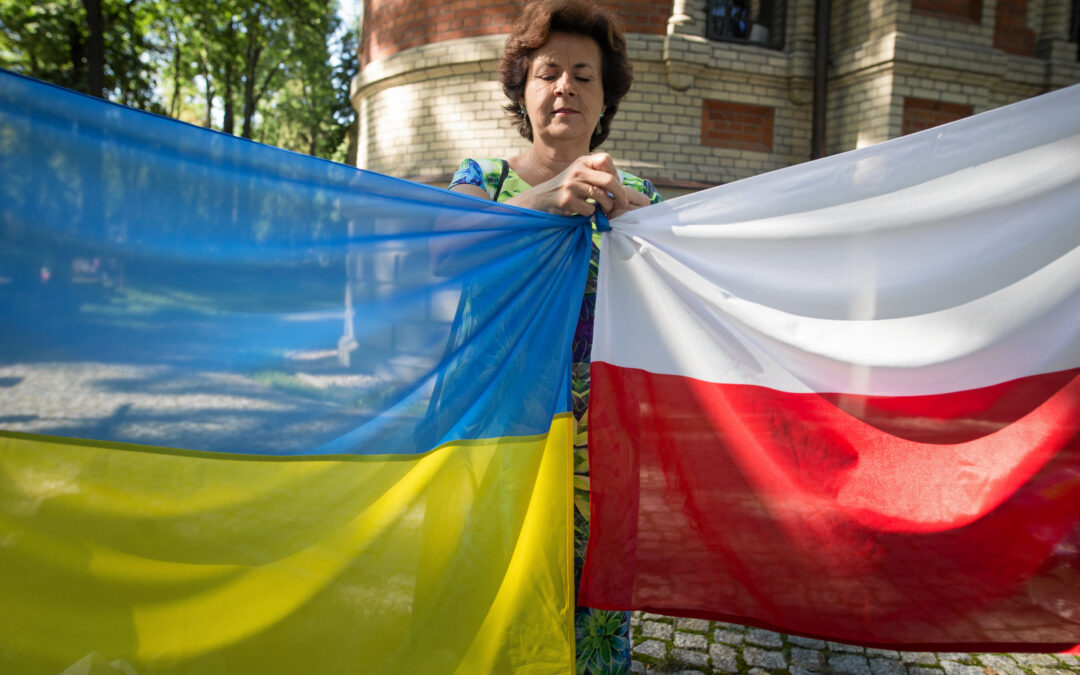People watching or reading Polish news reports on Russia’s invasion of Ukraine in recent days may have noticed a subtle linguistic decision regarding the way to say “in Ukraine”.
Many individuals and news organisations are pointedly saying and writing “w Ukrainie” instead of “na Ukrainie”, with the latter previously being the more common form and the “correct” one taught to learners of Polish.
The preposition “w” is the usual way of saying “in” in Polish and is used for most countries. But for some countries, including Slovakia and Hungary as well as island nations, the conventional word used for “in” is “na”, which also often refers to provinces and regions.
As a result, it is considered by some to implicitly make a country seem more provincial and less like an independent sovereign state. The distinction is roughly similar to that between saying “Ukraine” and “the Ukraine” in English. The issue is also made problematic by the fact that large parts of what is now Ukraine were once under Polish rule.
Also: in Poland, I am hearing more people saying “w Ukrainie” (with implication that it is a country), rather than the longstanding “na Ukrainie” (as if it were a territory) to mean “in Ukraine”; similar to “Ukraine” vs “the Ukraine” in English. A breakthrough.
— Annabelle Chapman (@AB_Chapman) March 2, 2022
“Poles, but also Ukrainians who know Polish think that the preposition ‘na’ is associated with regions and not states, which is why it bothers some people,” Jerzy Bralczyk, a well-known linguist, explained to Radio Zet.
According to Bralczyk, this is “not a question of correctness” but rather “a changing issue”. “In the case of Ukraine, older [Polish] people will no doubt say ‘na Ukrainie’, as I say, but I am in favour of young people saying ‘w Ukrainie’.”
Amid recent events in Ukraine, many leading Polish news organisations, including Gazeta.pl and Onet, have changed their official editorial policy to using “w” instead of “na”. Others, including Polskie Radio and Radio Zet, say it is a matter of personal preference.
Maciej Szklarczyk of the Tygodnik Powszechny weekly told Wirtualne Media that although “na Ukrainie” remained the usual form, “authors have the right to an individual decision what to write – we don’t change that”.
In a statement from last year, the Polish Language Council wrote that it is not responsible for making changes to Polish syntax – “certain changes occur independently” and become coded “if they receive social approval”.
But it also noted that the prepositions “w” and “do” have long been used in relation to both Ukraine and Lithuania and so any change in usage is nothing new.
Another linguist, Dorota Filar from Maria Curie-Skłodowska University in Lublin, explained that people are making a choice in the current situation as “it is about emphasising your attitude”, noting that she herself says “w Ukrainie”.
“These forms are historically determined and result from a certain linguistic tradition,” Filar added. “But language is a reflection of the world, culture, history. It is a living organism reacting to historical and political changes.”
Mirosław Bańko, another authority on the Polish language, has also argued that “‘w’ indeed seems to better emphasise the political independence of given areas”. Yet this is not just a matter of “political correctness”; the way to say “in Lithuania” has also been open to question and variation determined by historical factors.
“Na Ukrainie” is still a “correct and acceptable” form, said Marek Łaziński, a linguist from the University of Warsaw, but the key consideration is “what the Ukrainians living among us think and feel”.
“We should acknowledge that both forms are correct, give people the choice, and at the same time encourage people to empathise with the situation and accept the construction ‘w Ukrainie’,” Łaziński argued, quoted by Onet.
"Stop calling me Murzyn" – te słowa podczas protestu #BlackLivesMatter w Warszawie wywołały debatę nad językiem.
Zapytaliśmy o zdanie czarnoskórych Polaków, językoznawców, historyka, publicystę i aktywistkę https://t.co/tInIdLoThD
— Notes from Poland 🇵🇱 (@notesfrompoland) June 12, 2020
Main image credit: Jakub Orzechowski / Agencja Gazeta

Ben Koschalka is a translator, lecturer, and senior editor at Notes from Poland. Originally from Britain, he has lived in Kraków since 2005.




















